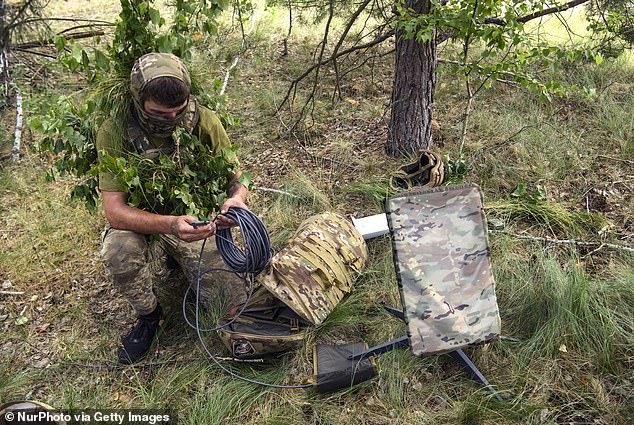
Elon Musk ordered engineers working at his Starlink internet company to cut off the service over the Crimean coast to prevent an attack on a Russian warship, according to a new book.
The world’s richest man began providing free access to his Starlink internet terminals in the early days of the Russian invasion, in February 2022, and his generosity has been vital in allowing Ukrainians to communicate, and coordinate resistance.
But, at the end of last year, his enthusiasm began to wane, and he became increasingly concerned about taking sides.
In a new biography, out on September 10, Musk asked author Walter Isaacson: ‘How am I in this war?’
Musk added: ‘Starlink was not meant to be involved in wars. It was so people can watch Netflix and chill and get online for school and do good peaceful things, not drone strikes.’

A Ukrainian soldier of the 61st Separate Mechanized Brigade uses the Starlink system in June this year in the Chernihiv region
Last month, Musk was accused of holding ‘the Ukrainians and the U.S. government at gunpoint,’ with his ability to switch off internet services on the Ukrainian front line at will.
Ultimately, the Pentagon paid Musk to keep the connection going, but journalist Ronan Farrow, in a profile of Musk for the New Yorker, spoke to Ukrainian and U.S. officials who were deeply uneasy about the power Musk held over the course of the war.
Farrow told CNN that there had been ‘a standoff over internet access in Ukraine.’
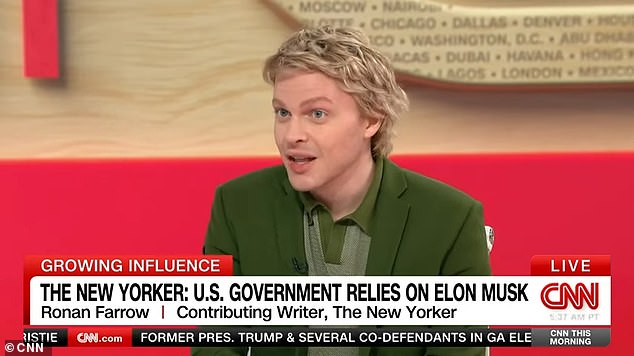



Ronan Farrow on Tuesday told CNN that Elon Musk had ‘the Ukrainians and the U.S. government at gunpoint’
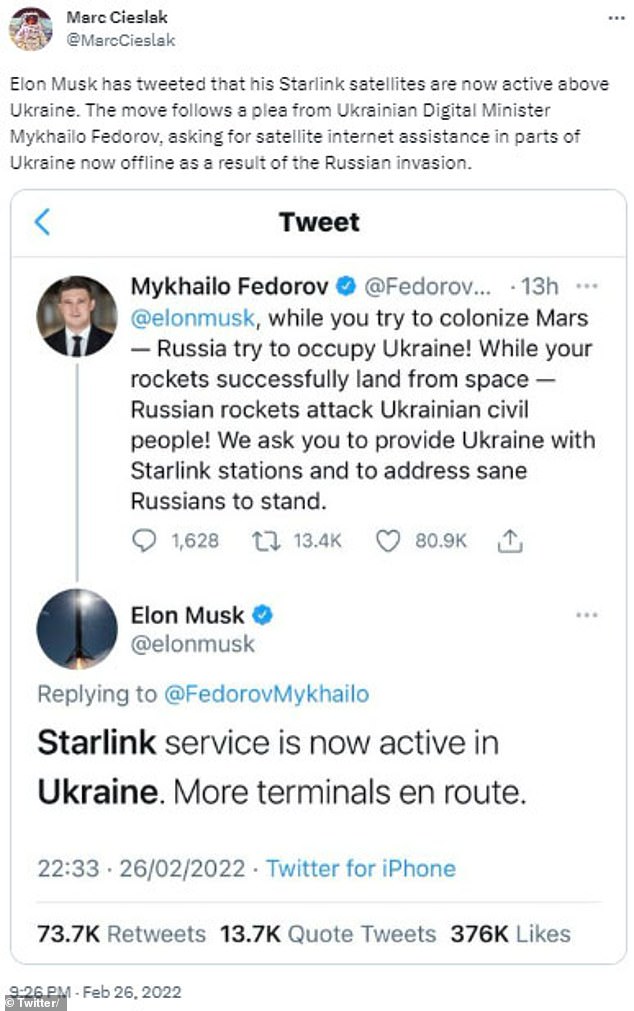





‘It appears he was talking to Vladimir Putin – he was telling multiple people that at the time, although he has since tried to deny that,’ said Farrow.
‘And then he was curtailing access specifically in areas that Russia was contesting.
‘At the end of that one of the things that happened was the Pentagon did pay up.
‘We’re going to make a deal in place to make sure this doesn’t shut off entirely.’
But Farrow said Ukrainians who had so praised Musk in the first year of the war were now worried about the whims of their mercurial benefactor.
Musk, in October 2022, was already complaining about the cost of providing the internet service. The world’s richest man has yet to respond to Farrow’s latest claims.
‘The hell with it … even though Starlink is still losing money & other companies are getting billions of taxpayer $, we’ll just keep funding Ukraine govt for free,’ Musk wrote.
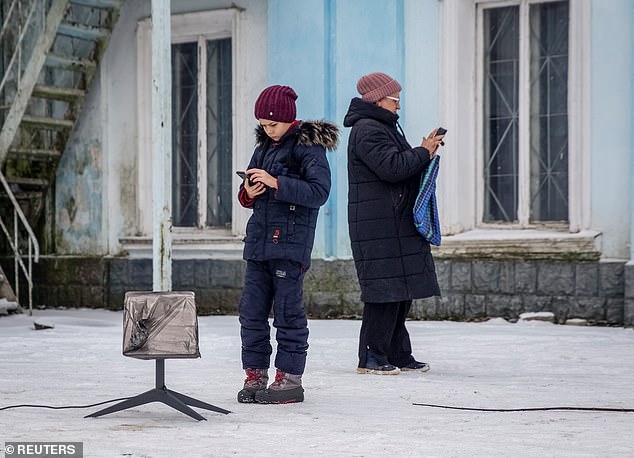





Local residents use a Starlink terminal, amid Russia’s attack on Ukraine, in Chasiv Yar, Donetsk region, on January 31
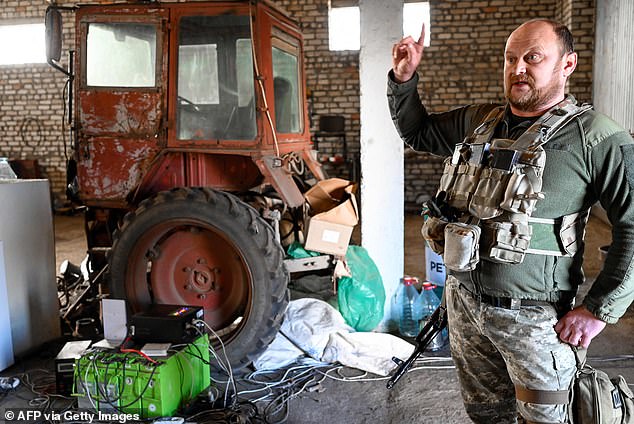





A Ukrainian soldier gestures as he stands next to the Starlink connection in October in Kherson
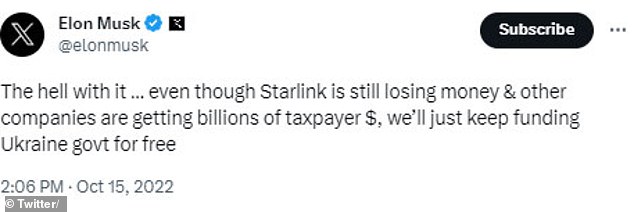





‘People on the ground in Ukraine, on the front lines, remained spooked,’ said Farrow.
‘We bought his services, apparently at a very generous rate.
‘This is a situation where, metaphorically, he had the Ukrainians and the U.S. government at gunpoint.
‘And to this day they do fear that he is going to curtail service more.’
Farrow said Musk’s meetings with Putin raised eyebrows.
‘There is nothing wrong with those kind of warm relationships between a private individual and significant government leadership, even in the context of a military contractor relationship,’ he said.
‘But this is something more, and different.’
He pointed out that the United States was now in the unprecedented position of relying on a private individual for NASA’s space transport, and for completing its self-prescribed transition to electric vehicles.
Farrow called it ‘a new extreme, and political, power.’
Defense officials were ‘panicked’ by the prospect of the internet service being switched off and Colin Kahl, then the Under-Secretary of Defense for Policy at the Pentagon, discussed the issue with Musk in October 2022.
A senior defense official told the New Yorker that several conversations took place with US staff, and Musk revealed: ‘Well, I had this great conversation with Putin.’
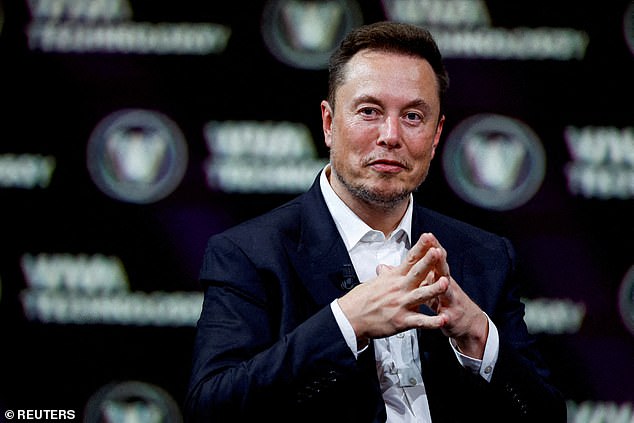





Elon Musk told senior Pentagon officials during a call about the war in Ukraine that he had a ‘great conversation with Putin’, it is claimed
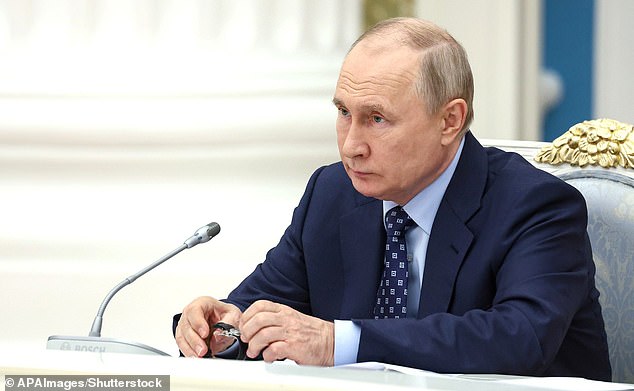





Reports that Musk had spoken with Putin about the war first surfaced last October, and the Tesla owner has denied the claim
The report said Musk ‘had said that his consultations with the Kremlin were regular’.
The report did not include further information about what Musk and the Russian president discussed.
Reports that Musk had spoken with Putin about the war first surfaced last October, and the Tesla owner has denied the claim.
The official who spoke to the New Yorker said the view in US defense circles about the alleged conversation was: ‘Oh dear, this is not good.’
Kahl said that ‘even though Musk is not technically a diplomat or statesman, I felt it was important to treat him as such, given the influence he had on this issue’.
As Musk grew uneasy about funding Starlink in Ukraine, he also argued publicly with Ukrainian leader Volodymyr Zelensky about possible diplomatic solutions, which could be found to the war.
Musk had tweeted that a deal could be reached that allowed Russia to maintain control of the Crimean Peninsula, which it occupied in 2014.
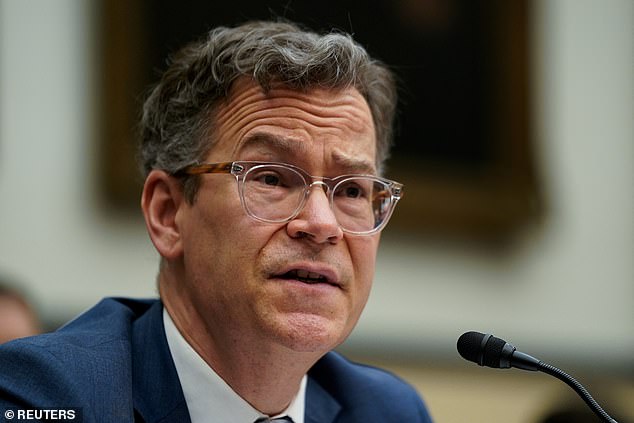





Colin Kahl, then the Under-Secretary of Defense for Policy at the Pentagon, spoke with Elon Musk last October amid fears in the Pentagon that Musk might switch off the Starlink service in Ukraine
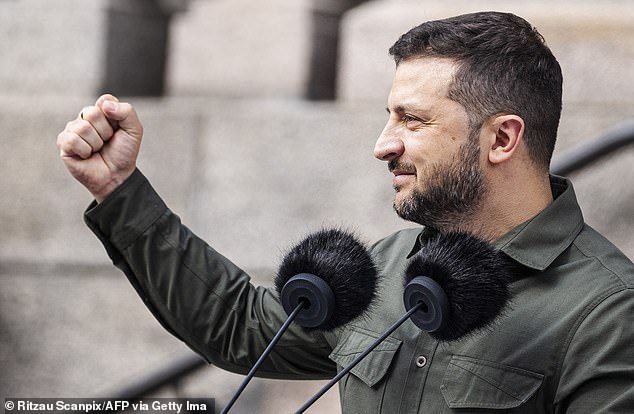





As Musk grew uneasy about funding Starlink in Ukraine, he also argued publicly with Ukrainian leader Volodymyr Zelensky about possible diplomatic solutions which could be found to the war
Zelensky responded with a sarcastic Twitter poll which asked: ‘Which Elon Musk do you like more?’: ‘One who supports Ukraine’ or ‘One who supports Russia.’
Ultimately, SpaceX continued to provide Starlink services and in June, the Pentagon said it had reached a deal to fund the service.
Musk had claimed it would cost Starlink $400 million per year to continue its funding for the service.
Kahl added: ‘My inference was that he was getting nervous that Starlink’s involvement was increasingly seen in Russia as enabling the Ukrainian war effort, and was looking for a way to placate Russian concerns.’
Musk said in October 2022 that he’d spoken to Putin ‘only once and that was about 18 months ago. The subject matter was space.’
Ukraine has reportedly been forced to abort several planned drone strikes on Russian targets after Elon Musk refused to grant access to the Starlink satellite network for offensive military maneuvers.
Kyiv had recently planned to remote-pilot a drone to deliver an explosive strike on a Russian navy ship at a Black Sea base in occupied Crimea.
But Musk denied the Ukrainian military the use of his Starlink network – whose services he offered to Kyiv earlier in the war – forcing army chiefs to stand down the attack, according to a report by the New York Times.
In the wake of the aborted strike, Ukraine army chief Valery Zaluzhnyi reportedly sought contact with U.S. chairman of the Joint Chiefs of Staff General Mark Milley, alleging that Musk had the ability to dictate his military’s capabilities to attack key Russian targets.
Zaluzhnyi said it was ‘concerning’ that Musk had scuppered several planned attacks.
The billionaire, who has offered his network of satellites to support Ukraine’s wartime communications in the months following Russia’s February 2022 invasion, has maintained from the outset that his technology is meant ‘for peaceful use only.’
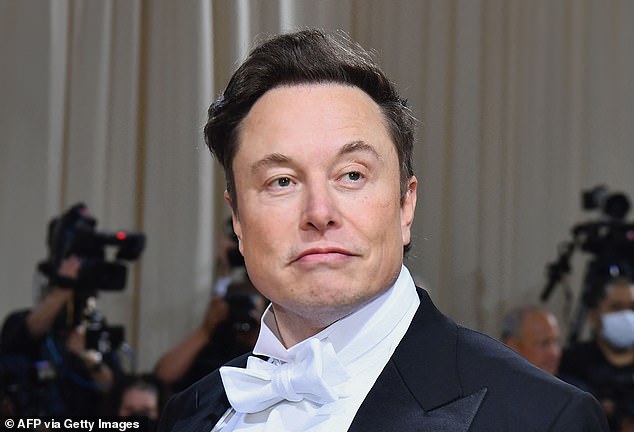





SpaceX CEO Musk, 52, has reportedly denied the Ukrainian military the use of his Starlink network on several occasions, scuppering planned attacks on Russian targets, according to a report by the New York Times
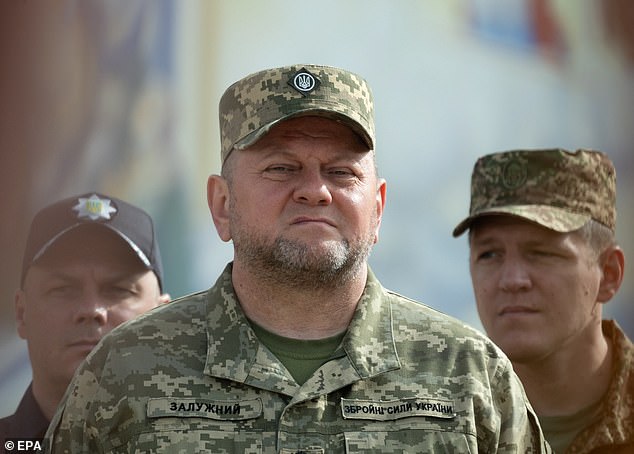





A handout photo made available by the Ukrainian Presidential Press Service shows Valeriy Zaluzhnyi (C), Commander-in-Chief of the Armed Forces of Ukraine, attending an event on the occasion of the Day of Ukrainian Statehood held on Mykhailivska Square in downtown Kyiv, Ukraine, 28 July 2023






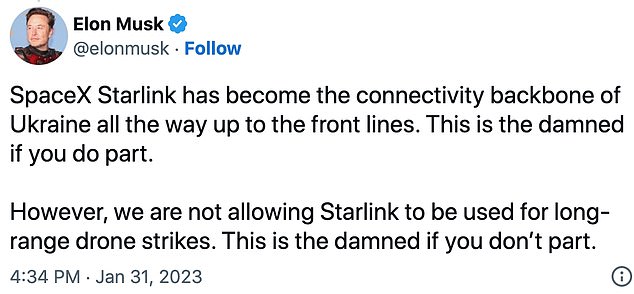





Musk, whose offered his network of satellites to support Ukraine’s wartime communications for free in 2022, has maintained from the outset that his technology is meant ‘for peaceful use only’
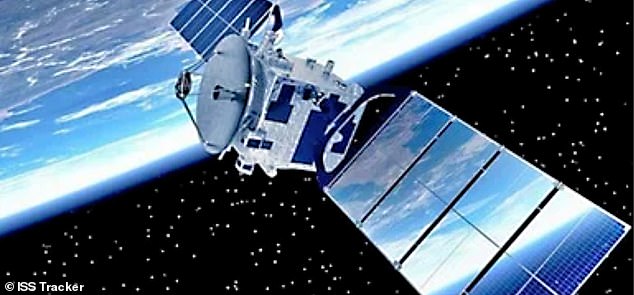





Musk’s Starlink satellites have provided essential comm support for Ukraine’s military since Russia invaded
The latest controversy over Starlink’s use for offensive military maneuvers comes after Gwynne Shotwell, the President of SpaceX, in February formally announced the company was limiting Ukraine’s use of Starlink for military purposes.
Shotwell stated the service could be used for typical communications and humanitarian efforts, such as connecting families and hospitals.
The service had enabled Ukrainians to benefit from uninterrupted, independent and secure internet access amid Russia’s consolidated missile attacks caused significant damage to Ukraine’s communications infrastructure.
In many cases, Starlink satellites became the only means of communication for the Ukrainian armed forces on the frontlines.
Starlink’s terms of service document clearly states: ‘Starlink is not designed or intended for use with or in offensive or defensive weaponry or other comparable end-uses.’
But Ukraine’s military had harnessed the technology to pilot drones carrying anti-tank grenades, destroying Russian tanks and army trucks.
In recent months, Kyiv has pioneered the use of naval ‘kamikaze’ drones – unmanned vessels laden with explosives that are driven toward Russian warships and detonated upon impact.
It has also used seafaring drones to destroy or damage infrastructure controlled by Moscow, most notably a stretch of the Kerch bridge that connects occupied Crimea to mainland Russia.
Source: | This article originally belongs to Dailymail.co.uk